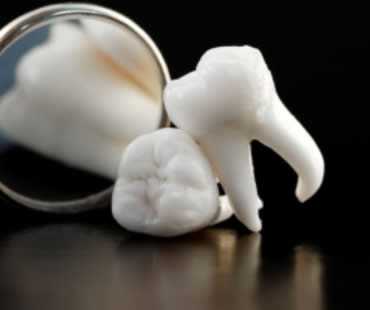
Wisdom teeth are the third set of molars, and usually emerge in the late teens or early twenties. Standard dental practice is to remove wisdom teeth prior to them being fully formed when the roots have not yet had a chance to develop and fully root into the jaw. Younger patients usually have an easier recovery from surgery and many dentists believe early removal prevents future dental problems associated with wisdom teeth.
If your wisdom teeth were not removed as they emerged, there are some signs and symptoms that would indicate the need for extraction including:
- Wisdom teeth that are impacted, which means they have become trapped in the jawbone or gums.
- Wisdom teeth that are emerging at an awkward angle, causing pressure on adjacent teeth.
- Wisdom teeth that do not fit in your mouth, causing crowding of the surrounding teeth as well.
- Wisdom teeth that are suffering from decay or disease caused by the inability to keep them cleaned properly.
- Wisdom teeth that have developed fluid-filled cysts near the gumline.
- Wisdom teeth that are causing pain due to any of the above reasons.
The decision about whether or not to remove your wisdom teeth should be made in consultation with your dental professional. Your dentist or oral surgeon can assess the position and health of your wisdom teeth and make a recommendation for treatment.
If extraction is recommended, they may choose to extract one tooth or all four molars at once. Recovery from the outpatient procedure takes just a few days, and you will quickly be back to normal. Contact our dental office if you are experiencing any of these symptoms listed to determine if you should consider wisdom tooth removal to ensure your future good oral health.
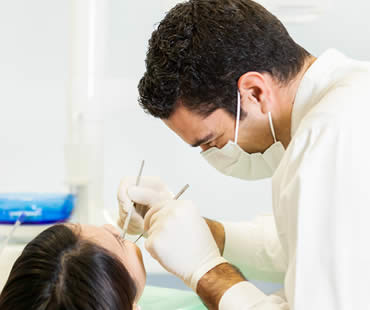
Wisdom teeth are the last adult teeth to erupt into the mouth, generally emerging between the ages of seventeen and twenty-one. They are the third set of molars and are in pairs: two each on the top and bottom arch of teeth. While some patients don’t have wisdom teeth, most do. Many of those who do have them don’t have enough room for those teeth to erupt fully, causing them to be wedged under the back of another tooth, impacted in the gum.
Impacted wisdom teeth are very difficult to clean, and can negatively affect the surrounding teeth. They are highly vulnerable to disease and decay and may lead to tooth pain and damage to adjacent teeth. For these and other reasons, a dentist may recommend that the teeth be extracted through oral surgery as soon as necessary to prevent any problems.
Extraction of wisdom teeth is typically an outpatient procedure done in an oral surgeon’s office. A healthy patient can proceed with a typical surgery, but if any infection is detected, the surgery can’t move forward until the infection is cleared up through the use of a full course of antibiotics. Once the surgery is moving forward, the surgeon’s team will administer some form of anesthesia to numb the area surrounding the tooth or to possibly sedate the patient through IV sedation dentistry.
After the anesthesia has fully taken effect, the surgeon makes an incision to open the gum and to remove any bone that is blocking the tooth from extraction. The tissue connecting the bone to the tooth will be separated and the tooth will be removed. In some cases, the surgeon will have to break the tooth into smaller pieces to make it easier to remove. After thoroughly cleaning the area and removing any remaining debris, the incision will be closed, stitched and packed with sterile cotton gauze to staunch any bleeding.
The surgeon will provide aftercare instructions. Patients should follow these instructions to the letter in order to ensure the best and fastest healing of the surgical site.
If you need a dentist in Ottawa contact us today
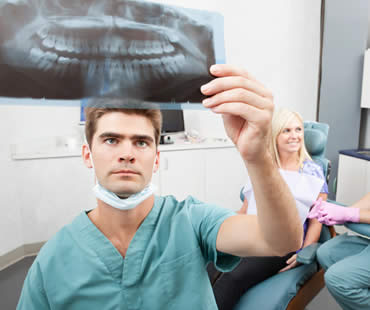
Gum disease is a serious problem. You should treat it as soon as possible following the recommendations of your dentist. Also known as periodontal disease, it has several treatments, depending on the severity of the issue.
Your first course of action is to completely revamp your oral hygiene habits. Daily flossing and brushing following meals are essential habits to develop. You must have a clean mouth before you go to bed. If you smoke, you should stop. Your mouth’s health depends on it.
If you haven’t been keeping up with your professional checkups and cleanings, you need to start again. Long-term gum health is greatly impacted by the plaque, tartar, food debris and bacteria left on teeth. Hardened calculus, or calcified plaque, can be removed using a process called scaling. This process may require local anesthesia.
Your progress will be evaluated by your dentist to see if your gum tissue is recovering. With enough progress and response to treatment, your gum disease treatment may not progress beyond these initial steps; however, for more severe cases of gum disease, you may require oral surgery.
Surgical procedures are available that can regenerate and repair the soft gum tissue in the mouth, as well as hard tissues such as bone or teeth. Your oral surgeon will want to reduce or completely eliminate gum pockets, or open areas beneath the gum line, improving and renewing gum to tooth attachment. Normal oral functions and aesthetic appearances are aimed to be restored.
There are many sedation dentistry options available to patients treating their gum disease with oral surgery. These include local anesthesia and IV or conscious oral sedation. Talk to your oral surgeon to see what’s appropriate for your specific needs.
Don’t wait to treat your gum disease. Do what you need to do to ensure a lifetime of better oral hygiene and gum health.
Our dental office is located in Ottawa
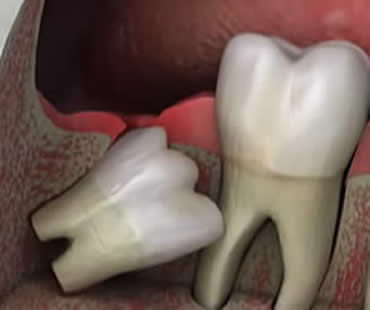
Also called third molars, wisdom teeth are the last set of teeth to erupt. Usually, people get their wisdom teeth in during their late teens and early 20s. Although some individuals have no trouble with their wisdom teeth, many people end up having these teeth removed because they may become impacted and create dental health issues. Learn more about wisdom teeth with this Q and A:
Do I need to have my wisdom teeth removed?
If your wisdom teeth aren’t causing problems, you can leave them alone. Typically, wisdom teeth are crooked or impacted, which can generate problems with the surrounding teeth. Also, wisdom teeth can be harder to keep clean, so the risk of decay on these teeth is higher.
When should I have these teeth taken out?
For optimal results, most dentists recommend wisdom teeth removal for patients when they are between 16 and 22 years old. The formation of the roots isn’t complete, so you have fewer complications.
Are there any risks?
As with any surgery, you can have issues arise, but the biggest concerns are nerve damage and dry sockets. Older patients have a greater chance of nerve damage because the root has more fully developed. Dry sockets occur when the post-surgery blood clots dislodge.
Does my age matter?
Some adults don’t experience any symptoms until they are in their 30s, 40s, or 50s. You can have these teeth extracted at any point, but when you get older, surgery is more difficult and the recovery takes longer. If you have trouble with your wisdom teeth, contact your dentist right away for a complete exam.
Ottawa dental office for wisdom teeth – PermaSmile! Dentistry@Slater
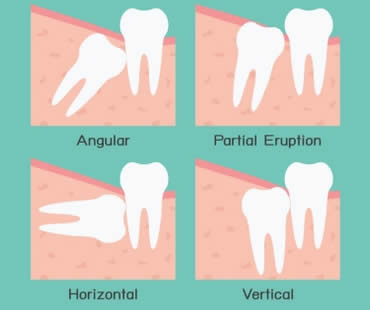
Wisdom teeth, your third set of molars, are named that because they are the final teeth to erupt. They usually come in between ages 17 to 25, and are located in the very back of your mouth on the top and bottom. Your dentist will examine you to find out if your wisdom teeth are properly positioned and healthy. If they aren’t, your dentist will recommend removal.
How do you know wisdom teeth should be removed?
Some of the signs there is a problem with your wisdom teeth include pain, infection, cysts, gum disease, damage to nearby teeth, and tooth decay. If you experience any of these symptoms, see your dentist for an examination.
What are impacted wisdom teeth?
Sometimes your teeth just don’t have room to grow in properly. They can erupt at angles within your jaw, sometimes even horizontally. If wisdom teeth aren’t able to erupt normally they can become trapped, or impacted, inside your jaw. Symptoms of impacted wisdom teeth are pain, infection, and swelling. When teeth are impacted, they can lead to serious problems. Many dentists want to avoid impacted teeth and therefore remove your wisdom teeth before they erupt or grow too big.
Are there less obvious reasons to remove wisdom teeth?
It’s not always clear when these teeth way in the back of your mouth are causing problems, or might in the future. Many dentists remove them in teens or young adults so they don’t cause problems later, or become too firmly planted in the jaw. Also, sometimes wisdom teeth are removed as part of orthodontic, periodontal, or restorative treatment plans.
What happens if I don’t have them removed?
Some dentists prefer to wait and see what happens with time to your wisdom teeth. Make sure you continue to have these teeth monitored, because the risk of problems doesn’t go away with age. Removing wisdom teeth isn’t always necessary, because if there’s room in your mouth and they come in properly, they work just like any other teeth. The key is to watch them to make sure problems don’t arise in the future.
Dental office for wisdom teeth removal

While minor gum recession can be treated by your dentist with deep cleaning and antibiotics, serious gum recession can only be treated with oral surgery. A loss of bone and gum pockets that are very deep require gum surgery to address the pain and damage left by acute gum recession.
Three treatments are used primarily in the treatment of serious gum recession, in order of invasiveness: pocket depth reduction, regeneration, and soft tissue graft. Pocket depth reduction involves a deep cleaning of the affected area. The periodontist folds the gum tissue back and utilizes tooth scaling and root planing to remove any tartar and plaque built up around the tooth. Once the gum pockets are clean, the surgeon pulls the gum tissue gently around the tooth, eliminating the deep pockets altogether or significantly reducing their depth.
Regeneration utilizes a similar treatment to pocket depth reduction, but it also addresses any bone loss that occurred due to acute gum recession. In this process, a regenerative agent such as graft tissue, membranes or tissue stimulating proteins is added to the affected area. The gum tissue is then tucked into place and stitched down. Over time, the regenerative agent will work to rebuild lost bone and tissue, leaving healthy and thriving tissue behind.
The most common soft tissue graft is taken from the patient’s own mouth, either by removing tissue from the roof of the mouth or from the gum tissue near the affected tooth. The healthy gum tissue is placed in the affected area, over the exposed tooth root, protecting it from infection and damage.
To prevent the need for oral surgery to address your receding gums, have good oral hygiene habits. Brush, floss and see your dentist twice a year for checkups and professional cleanings. Talk to your dentist if you have any other questions about how to reverse or prevent gum recession.
If you need a dentist in Ottawa contact us today







